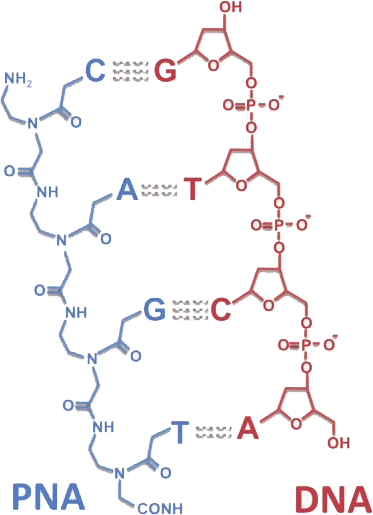
Peptide nucleic acids (PNAs) are synthetic mimics of DNA. The deoxyribose phosphate backbone of PNAs is replaced by a pseudo-peptide polymer. These specific physicochemical properties are exploited to develop a wide range of powerful biomolecular tools, including molecular probes, biosensors, and antigene agents. The PNA molecules can routinely be labeled with biotin, azido, cell penetration peptide fragments, or fluorophores such as FITC, Cy3, Cy5, Cy7, Alexa Dyes, and pyrene.
The uncharged synthetic backbone provides PNA with unique hybridization characteristics. It gives higher stability, or a higher thermal melting temperature (Tm) to the PNA–DNA or PNA–RNA duplexes than the natural homo- or heteroduplexes. In addition, the unnatural backbone of PNAs is not degraded by nucleases or proteases.
It was shown that the binding of PNA to complementary DNA can efficiently block transcriptional elongation and inhibit the binding of transcriptional factors. Thus, the PNAs can be used as antisense or antigene therapeutic agents. PNAs can be used as adapters to link peptides, drugs, or molecular tracers to plasmid vectors. One concept is to form the duplexes of PNAs – cell penetration peptides. The duplexes can penetrate into cells and be used in anticancer applications. The nuclear localization signal (NLS) peptide-PNAs duplexes gave a much higher nuclear localization of a coupled nuclear localization signal than did the free oligonucleotide.

The strategy of PNA-directed PCR clamping is used to inhibit the amplification of a specific target. This PNA–DNA complex formed at one of the primer sites effectively blocks the formation of the PCR product. The procedure can be used to detect single base-pair gene variants for mutation screening and gene isolation. The biotinylated short PNA probes can be used as generic capture probes for the purification of nucleic acids via streptavidin beads. Other applications could be solid-phase hybridization, and fluorescence in situ hybridization (PNA-FISH).
PNA-based applications benefit from the unique Physico-chemical properties of PNA molecules, enabling the development of cell penetration peptide-PNA assays in molecular genetics.